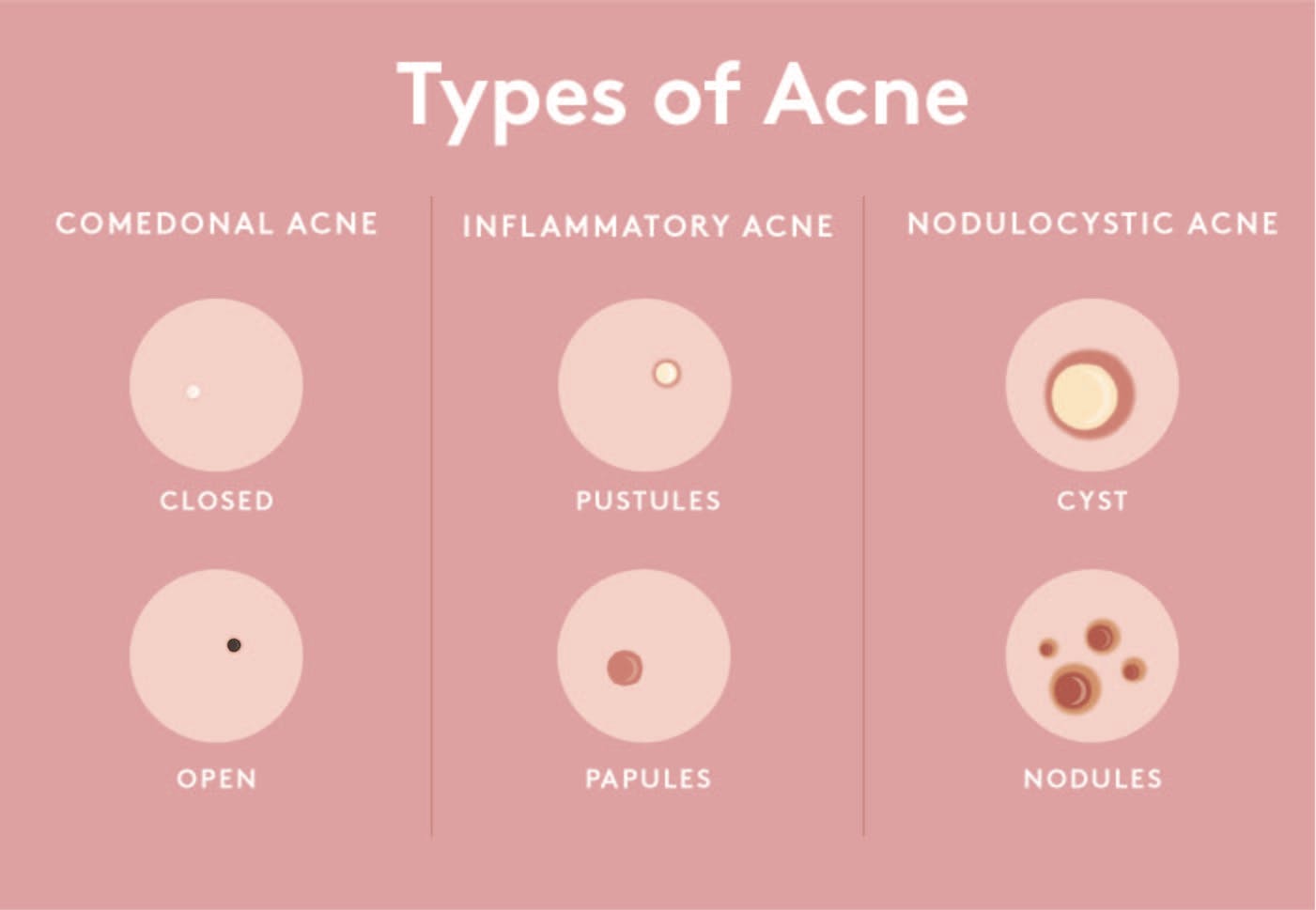Acne · March 26, 2018
Your Guide To The Different Types of Acne


Acne is broken up into three main groups:
Comedonal Acne
Occurs when excess oil and dead skin cells get trapped in your pores. There are two types of comedonal acne:
- Closed Comedone (aka whiteheads/clogged pores): Happens when a layer of skin forms over the gunk in your pore to create a flesh-colored bump.
- Open Comedone (aka blackheads): When the gunk in your pore gets exposed to air, it oxidizes and turns black.
Inflammatory Acne
Once the gunk in your pore mixes with naturally occurring bacteria, it creates an infection causing visible swelling and inflammation. There are also two types of inflammatory acne:
- Pustules (aka red bumps with white pus): These are simply red bumps with a head on the top (your more traditional-looking zit).
- Papules (aka red bumps): Sometimes your pimple doesn't form a head and just looks like a red bump.
Nodulocystic Acne
This is a much more severe infection that occurs deep down in the layers of the epidermis (your skin). It takes on two forms as well:
- Nodules (aka under the skin bumps): These never form a head and tend to be more painful. Try to leave them to the pros to extract or inject with a cortisone shot.
- Cysts (aka large painful pimples): They look very similar to pustules but are bigger, more painful, and sometimes itchy.

Rather than popping your pimples (put those fingers down), get rid of them with these ingredients.
Salicylic Acid (BHA)
- Best For: Inflammatory and Comedonal Acne
- This antiacne and anti-aging ingredient can deeply penetrate pores, get into the sebum, and stay there to treat a blemish, breaking down the dirt and oil.
- Product Pick: Paulas Choice Skin Perfecting 2% BHA Liquid Exfoliant
- Tip: Don't mix this product with retinol to avoid irritation. Only use every day if you have severe acne, otherwise 34 times per week for mild acne.
Zinc + Sulfur
- Best For: Nodulocystic Acne
- While nothing can truly penetrate a deep infection like a cyst or nodule, these two ingredients can help reduce the size of them and eliminate oil while soothing the area.
- Product pick: (MALIN+GOETZ) acne treatment nighttime

Prevent pimples from forming in the first place when you incorporate products with these ingredients into your routine.
Glycolic Acid (AHA)
- Best For: Comedonal Acne
- Glycolic acid sloughs off layers of dead skin cells, removes dirt and oil from pores, and also has rejuvenating benefits for a nicer glow. It won't treat inflamed blemishes but it will help dislodge blackheads and whiteheads.
- Product Pick: Cane + Austin 2%/5% Acne Retexture Pads
- Tip: Don't mix with retinol and only use 23 times per week depending on how sensitive your skin is.
Retinol
- Best For: All Types of Acne
- This anti-aging powerhouse increases cell turnover so it keeps dead skin cells from getting caught in your pores in the first place. It also slows down signs of aging and evens out tone and texture.
- Product Pick: Murad Retinol Youth Renewal Serum
- Tip: Be sure not to mix with vitamin C as this can cause irritation.

These ingredients promote clearer skin and can be applied frequently (every day in the case of niacinamide) if you have no existing blemishes but are concerned about any returning.
Niacinamide
- Best For: All Types of Acne
- It helps reduce excess sebum and the appearance of blemishes. It's also good for brightening your complexion overall.
- Product Pick: Huxley Secret of Sahara Glow Awakening Cream
Charcoal
- Best For: Mild Comedonal Acne
- Charcoal naturally attracts dirt and oil, so it can draw out grime from pores, eliminating blackheads.
- Product Pick: ORIGINS Clear Improvement Active Charcoal Mask to Clear Pores
- Tip: Use once a week or as often as needed. Wash your face with a salicylic acid cleanser to dislodge comedones before applying.
Always Remember
Gradually Incorporate a New Ingredient
Many of these ingredients are strong and effective, which is great, but they can also cause irritation as you begin to use them. Gradually incorporate a new product into your routine starting a couple times per week to see how your skin reacts. Some can be used together, but not all, so be sure to take note above of which ones should never be mixed.
Wear SPF
While we think you should wear sunscreen every day, rain or shine, it's especially important when you are using acne treatments in your routine. They make your skin more sensitive to the sun and their efficacy decreases when exposed directly to its harmful rays if you're not wearing anything.
Acne is Not a Flaw
Having acne is nothing to be ashamed of and not something you should feel pressured to clear up or cover up. It's much more common than you think and if you decide that you want to treat your acne, that's great, and if you don't, that's really great too. It's your skin and your choice. Whether you get the occasional flareup or have multiple breakouts, it's 100% OK to embrace your face just as it is (which is beautiful, by the way).